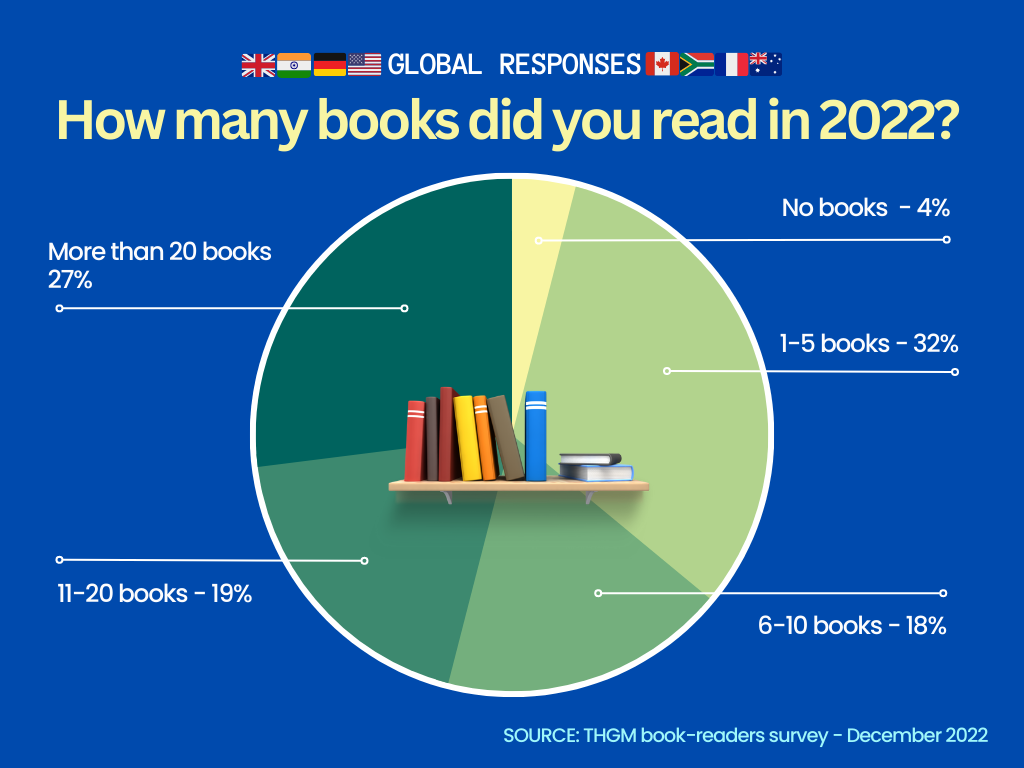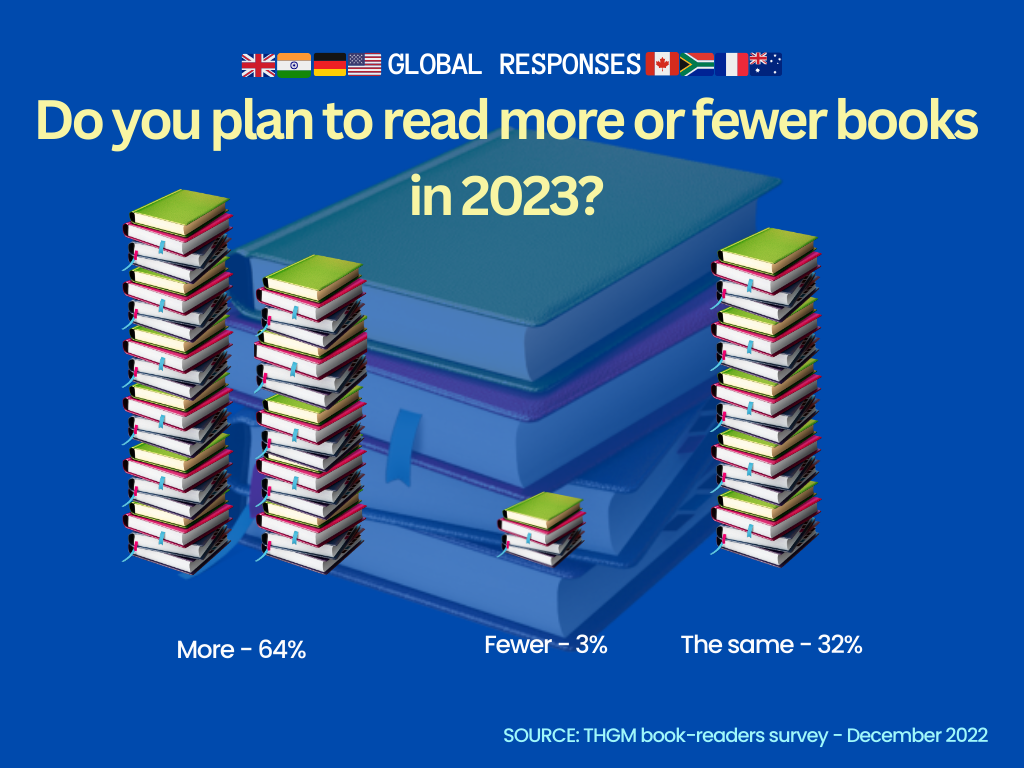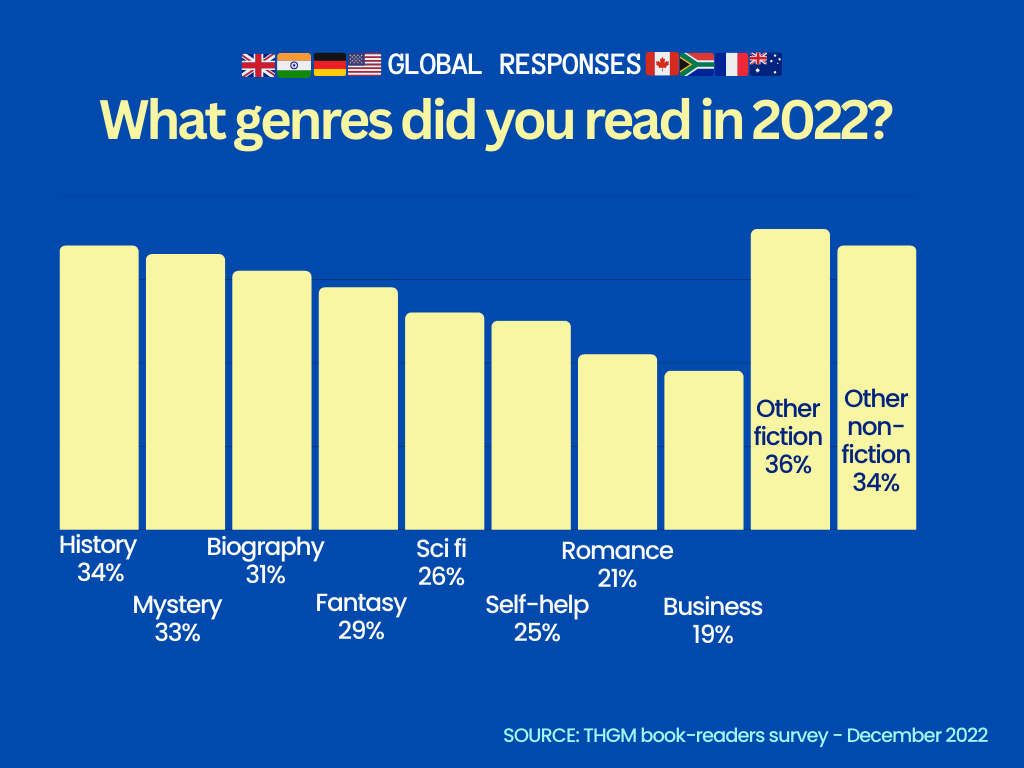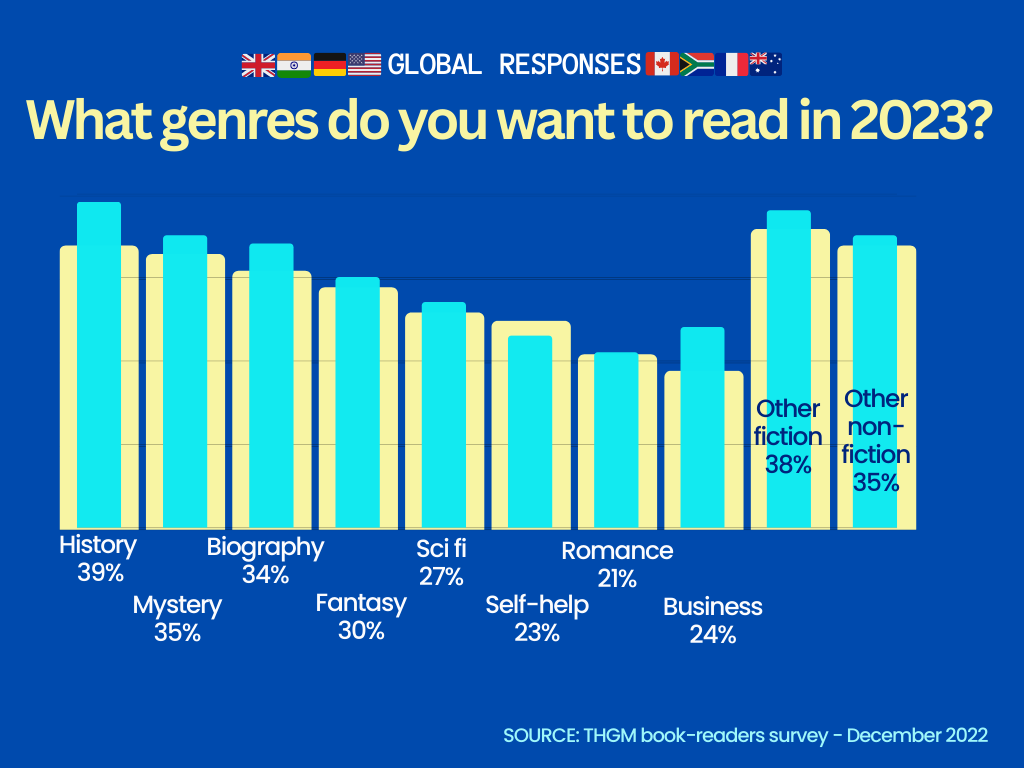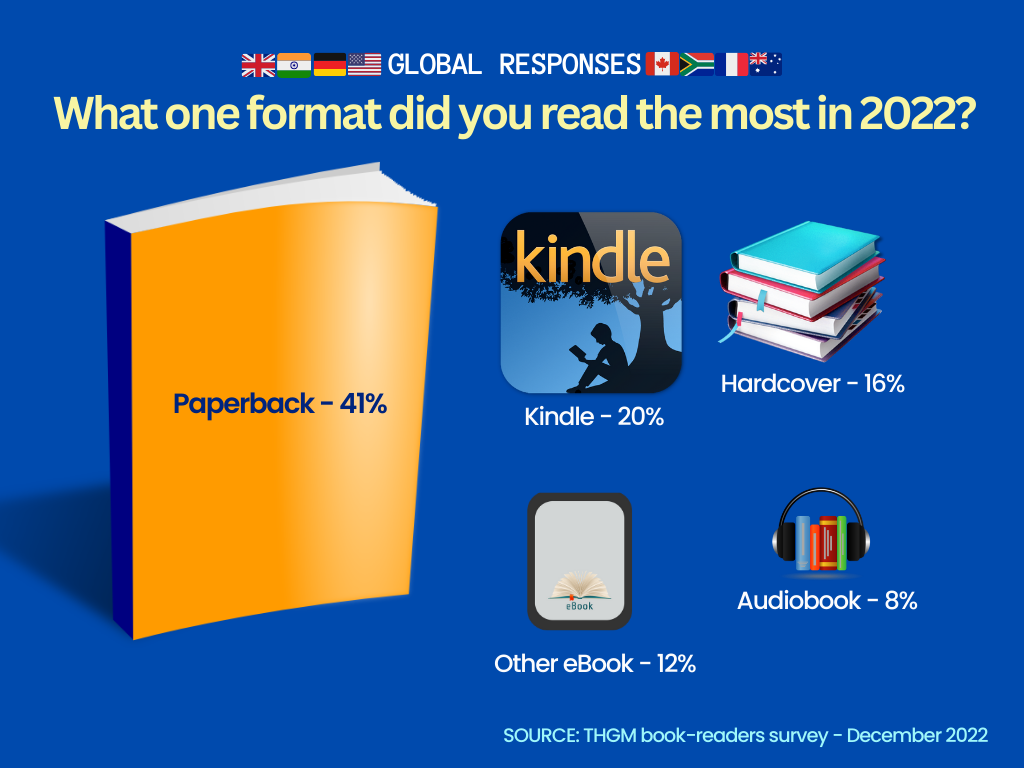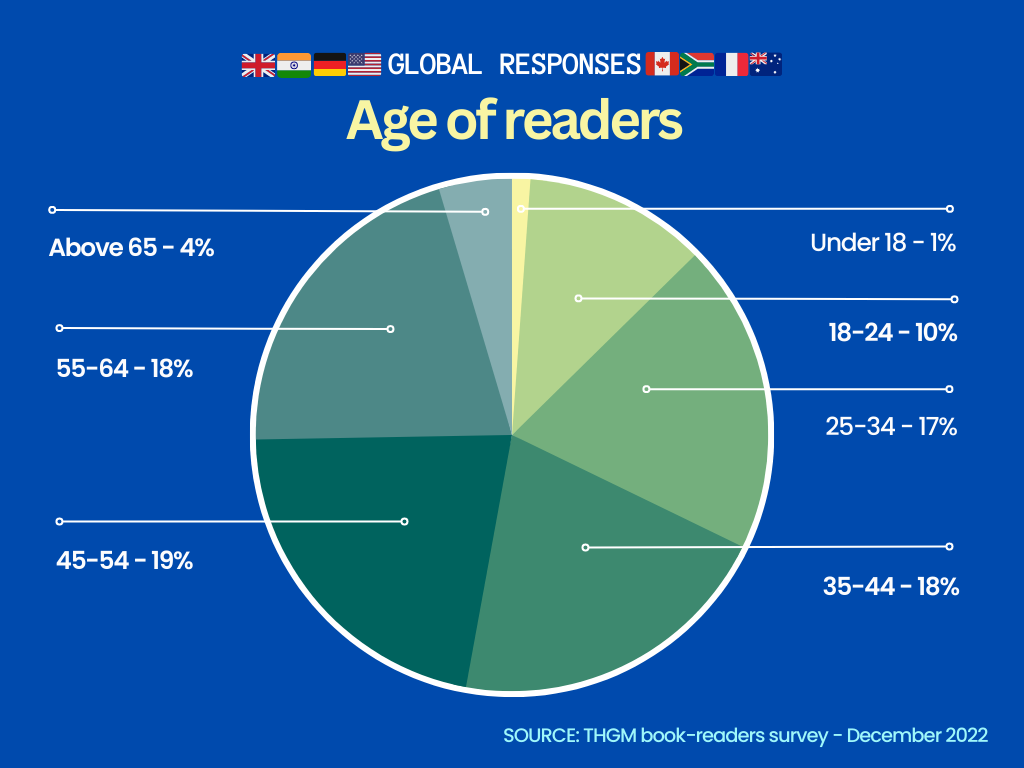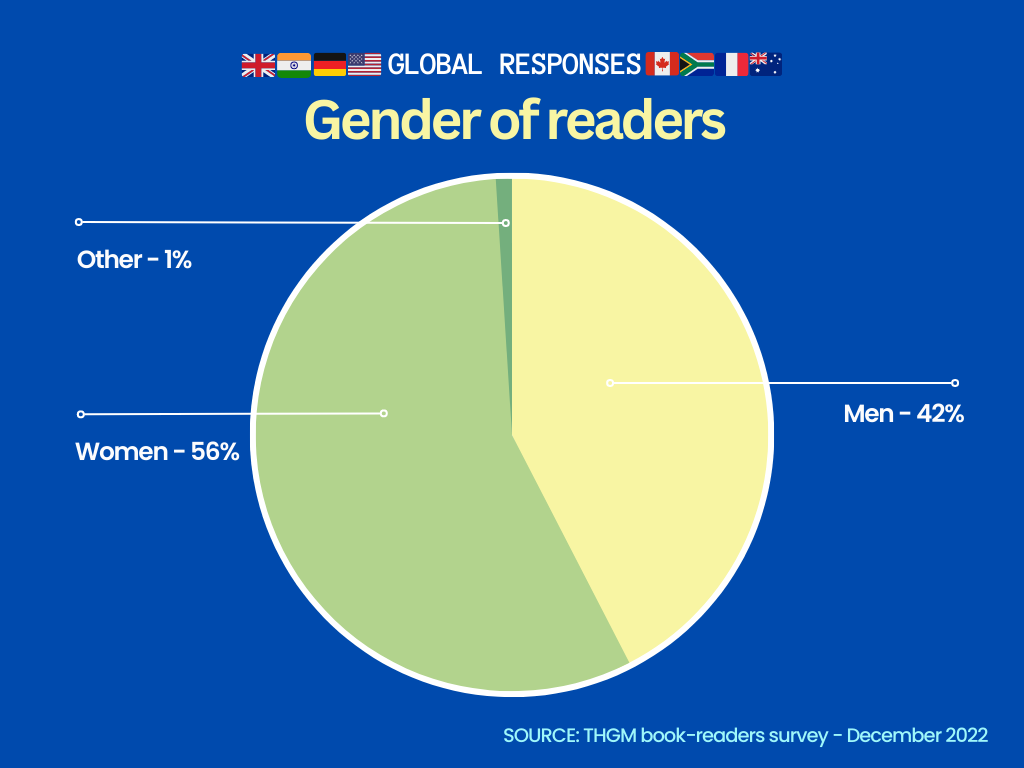What are the most popular books in the world? We asked 945 book readers in 56 countries what genre of books they read in 2022 and what they plan to read in 2023. Here are the world book reading statistics from the survey results.
We wanted to know what, how and how much people were reading. So, we asked 945 readers in 56 countries about their book reading habits. Here is what these book readers had to say.
- Click here for the book reading data from the United States.
- Click here for the book reading data from Canada.
Reading is alive and well. People around the world responded to our reading survey, and they shared the details of the books they read and how they read them. Here are some of the key findings of the global survey results.
Key findings from the book reading statistics
- Key finding 1: Most people read either a few books or a lot of books.
- Key finding 2: People plan to read more in 2023.
- Key finding 3: The top books people love reading are history, mystery and biography.
- Key finding 4: Readers want to read more history, mystery and biography.
- Key finding 5: People still love paper books.
- Key finding 6: People like the length of their books.
- Key finding 7: Readers come in all ages.
- Key finding 8: More women than men see themselves as readers.
We captured the data. We captured the uncensored, anonymous comments. Here’s what we found.
Key finding 1: Most people read either a few books or a lot of books.
We asked people how many books they read in 2022. It turns out there are many light readers, and quite a few dedicated bookworms, but much fewer moderately-committed readers.
Survey says: according to the latest book reading statistics, 27% said they read over 20 books in 2022, whereas 32% said they read one to five books. Just 18% said they read six to 10 books, and 19% read 11 to 20 books in 2022.
Regionally, American and British readers tended to be high consumers of books (39% and 44% respectively reading more than 20 books), whereas Canadians tended to be lighter readers (23% reading more than 20 books).
Worth noting is that some people felt we limited the question too much by making “more than 20 books” the top category. “Over 100 books,” commented one Canadian reader. “Having 20+ as the highest category seems very low,” commented a British reader.
If people are reading so many books, what are those books about? You will find the answer in Key finding 3.
Key finding 2: People plan to read more in 2023.
Predictions that the end of books was nigh have proven to be premature. If books are to fade into obscurity one day, that day is not yet on the horizon. In fact, the data shows that people plan to read even more in 2023 than they did in 2022.
Survey says: 64% of readers plan to read more books in 2023 than they did in 2022. Just 3% plan to read fewer books. These results are fairly similar across all regions. One Kenyan reader summed up the mood of the survey: “I enjoyed all the reading this year. I’m looking forward to reading more.”
Whether people end up reading more in 2023 or simply aspire to do so, only a well-oiled crystal ball will tell. Nevertheless, the intention to read more shows that their love of books remains strong.
Reading is alive and well. In the words of one Australian reader: “I just love reading, it’s my favourite pastime.”
If people plan to read more, what are they planning to read? You will find the answer in Key finding 4.
Key finding 3: The top books people love reading are history, mystery and biography.
We asked people about the books they are reading. We wanted to know if they were reading fiction or non-fiction. And we wanted to know what genres were their books. Let’s see what the statistics show.
Survey says: according to the latest book reading statistics, the top three genres around the world in 2022 were:
- History (34%)
- Mystery (33%)
- Biography/memoir (31%)
We noted some minor regional differences. Canadians were much less interested in history. Meanwhile, UK readers showed a strong interest in fantasy.
Other well-read genres were fantasy, science fiction and self-help. Both other fiction and other non-fiction were selected by many readers (36% and 34% respectively), meaning that next year we will have to add more categories. And many respondents offered suggestions. Here are a few of them:
- “I love reading poetry books, maybe that should be a category.” (Kenyan reader)
- “Horror and cookbooks aren’t listed. I read a lot of those.” (US reader)
- “I also read a lot of children’s books to my preschooler.” (Canadian reader)
- “I also read a lot of spiritual and poetry.” (US reader)
- “It isn’t specifically on your list, but I read a lot of horror and multi-genre.” (US reader)
- “I normally love to read more spiritual books with lots of history and knowledge.” (Indian reader)
- “I read a lot of plays and fanfiction.” (Canadian reader)
- “I read little modern fiction, no mysteries or romances. Strongly prefer poetry, non-fiction, and older novels.” (US reader)
- “You don’t have a category for poetry or one for short stories, so I had to lump both together under ‘Other Fiction.’“ (US reader)
- “I read mostly non-genre fiction and philosophy.” (Canadian reader)
- “I like reading freestyle poetry as well.” (Pakistani reader)
- “I’m an adult who reads a lot of horror and non-fic, but I still read graphic novels, picture books, & chapter books, too.” (US reader)
- “I read mainly 20th century paperback horror. there wasn’t a genre option for horror but I focused a lot on that.” (US reader)
- “I read a lot of LGBTQAI leaning books.” (Irish reader)
- “Love horror and true crime.” (US reader)
- “Philosophy!” (Canadian reader)
- “Popular science and literature.” (UK reader)
- “Social justice, education, psychology.” (US reader)
So, it looks like next year, we will expand the categories. At very least, we’ll need to add horror, poetry, children’s books, philosophy, spiritual and comics (like manga and graphic novels).
Key finding 4: Readers want to read more history, mystery and biography.
If people said they plan to read more in 2023, it should come as no surprise that more people plan to read each genre in 2023 than in 2022.
Survey says: the three top genres people around the world plan to read in 2023 are:
- History (39%)
- Mystery (35%)
- Biography/memoir (34%)
Other in-demand genres were fantasy, science fiction and adventure. Both other fiction and other non-fiction were selected by many readers (38% and 35% respectively).
In the graph below, the numbers and the blue bars represent what people plan to read in 2023. They are superimposed over the yellow bars, which represent what people read in 2022. You can see that in almost every genre, the statistics show that people aspire to read more than in 2023.
Again, we noted some miner regional differences. Canadians were much less interested in history, and much more interested in science fiction. Meanwhile, American readers want to read a lot more “other fiction”. This strengthens our need to add more categories, such as poetry, horror and comics/manga, next year.
Key finding 5: People still love paper books.
The demise of books has been predicted – and disputed – for over a decade. Yet, people are still reading them.
I wrote about the pros and cons of eBooks in 2017, citing more pros than cons. Yet, I still read paper. Am I the only one? That’s not what the book reading statistics in our survey say. We asked people to name the one format they read the most in 2022.
Survey says: 57% of people read paper (print books) most – 41% paperback and 16% hard cover. 32% of readers chose eBooks – 20% Kindle and 12% other eBooks. Another 8% listened to audio books and 3% chose “other” (which might include comic books, brail or some other format).
That is a strong vote of confidence in paper around the world, but with some equally strong regional differences.
Americans are less interested in paper and somewhat more interested in all other formats. Striking is the 29% of American readers who love their Kindles. Canadians show the exact opposite inclination, with 67% reading mostly paper, including 53% paperbacks, and just 23% opting for eBooks.
Key finding 6: People like the length of their books.
Writers sometimes struggle with their manuscripts. Have I included too much? Do I need more detail? Will people find my book too short or too long?
Writers: just keep doing what you are doing.
Survey says: according to the latest book reading statistics, 86% of readers think their books are just the right length. 11% think they are too long in this age of short attention spans, but 3% of dedicated can’t-get-enough readers think their books are too short.
Of course, not everyone agrees. One Italian reader said, “I love really long reads, something I can really dive into.” But an American reader countered, “Books over 600 pages really slow you down. No end in sight.”
Key finding 7: Readers come in all ages.
If you thought that the enduring popularity of books, and paper books in particular, was due to old-timers having difficulty adapting to new technology, this survey suggests otherwise.
Survey says: There are roughly equal number of readers 25-34, 35-44, 45-54 and 55-64.
Key finding 8: More women see themselves as readers than men.
Who reads more, women or men?
Survey says: 56% of respondents were women, 42% were men and 1% identified as other. This divide was even more pronounced in the United States, where two-thirds of respondents were women. This is consistent with other research that shows girls and women around the world read more books.
Survey methodology and limitations
We surveyed 945 people about their reading habits in December 2022 to gather book reading data. Because this is an Internet poll, no margin of error is assigned to the results. The results have not been weighted by age, gender, location or any other factor.
This was not a random survey. Respondents tended to self-identify as “readers”. Most people who do not read books or have not read books in a while declined to participate. When citing this survey, it would be most accurate to refer to “world readers”.
The survey was disseminated primarily through social media. The accounts used to reach people were primarily on Twitter and LinkedIn, as well as on Facebook and some smaller networks. The bias on these accounts, based on the composition of their followers, skews towards:
- writers, authors and self-identified book lovers
- bloggers and online marketers
- other artists (musicians, crafters, photographers, etc.)
The bias on these accounts, based on the composition of their followers, skews away from:
- sports-themed accounts
- religion-focused themes
- scientists and healthcare accounts
- fashion-focused accounts
- food- and travel-themed accounts
In the global results, there is a massive bias towards English-speaking people, and therefore English-dominant countries. In particular, Canada is overrepresented for its size. We do not consider the UK sample size large enough for us to treat it as statistically definitive; it should be consumed for “entertainment value” only.
A HUGE “Thank you!” to all who completed the 2022-2023 reading survey and shared their book reading habits with us. You people rock!
Permission is granted to republish the graphics on this page and cite the book reading statistics. Attribution is required, and a link back would be appreciated (and useful for readers) but not required.
We’ll leave the final word to a participant from Algeria: “I love books. Everyone should read a book.”
David Leonhardt is President of The Happy Guy Marketing, a published author, a "Distinguished Toastmaster", a former consumer advocate, a social media addict and experienced with media relations and government reports.
Read more about David Leonhardt

